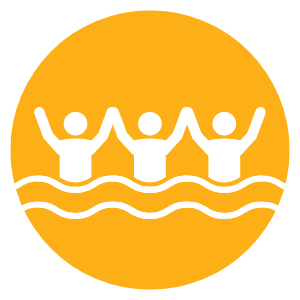Get your Splash on!
Swim Test Policy
For safety purposes, all swimmers under the age of 13 must take a swim test and wear a swim band based on their swimming ability before entering the water. Other swimmers may be asked to take a swim test at the lifeguard’s discretion.
Our swim test is designed to check the swimming abilities of a child. Based on this test, the child receives a colored band that signifies their swimming ability.
-
YMCA staff may close the pool at any time for safety reasons, including but not limited to:
Chemical Imbalance
Mechanical Issues
Water Clarity
Pool Contamination
Natural dangers (lightning or thunder within 10 mines will constitute immediate closure for no less than 30 minutes from the last lightning strike or sound of thunder)
-
It’s about to get very hot outside and you’re going to want to go swimming—whether it’s in your own pool, at the beach, or on a boat! We want to make sure you’re safe, so we’ve compiled a few tips to follow both in and out of the home.
Supervise in and around water
Designate a responsible adult to watch young children while in the bath and all children swimming or playing in or around water. Supervisors of pre-school children should provide “Touch supervision”, which is to be close enough to reach the child at all times.
Empty all water after use
Empty all tubs, buckets, and kiddies pools immediately after use to prevent any accidents. Once drained, flip the container upside down so it doesn’t collect any more water.
Install fences around pools
Surround your home pool with a protective fence, preferably with a self-closing door to prevent children from wandering in unattended.
Learn to swim
There’s no shame in not knowing how to swim. A lot of adults don’t learn to swim until later in life—whether it’s because they never got the chance to learn or had a traumatic experience as a child. Learning to swim can help save your life and those around you! Don’t use air-filled or foam toys.
Use a lifejacket
Try to avoid air-fill or foam toys, such as water wings, noodles, or inner tubes. Use life jackets instead!
Learn CPR
Accidents happen. You should know how to act in an emergency. CPR can help save the life of someone involved in a water-related accident.
Avoid Alcohol
Avoid drinking alcohol before or during swimming, boating, or water skiing. Do not drink alcohol while supervising children. Use the buddy system
Always swim with a buddy
It’s more fun, plus it’s safe!







